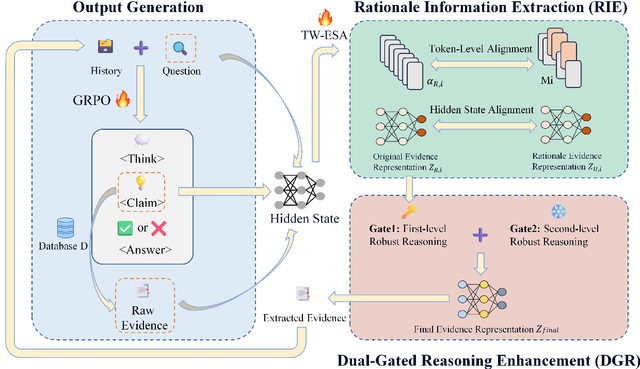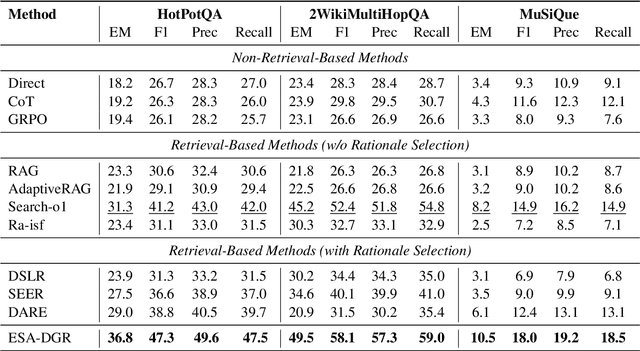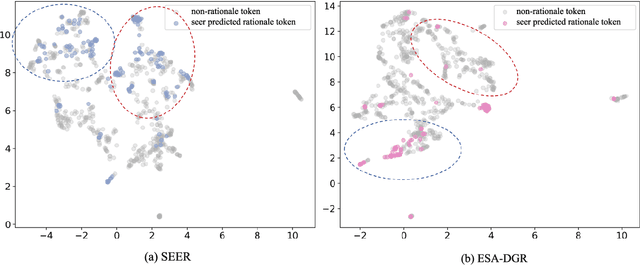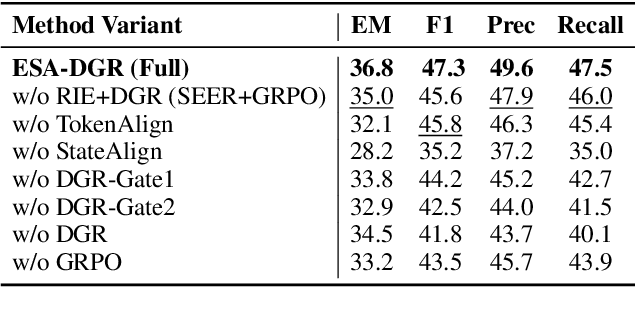Yangyang Feng
Two-way Evidence self-Alignment based Dual-Gated Reasoning Enhancement
May 22, 2025



Abstract:Large language models (LLMs) encounter difficulties in knowledge-intensive multi-step reasoning (KIMSR) tasks. One challenge is how to effectively extract and represent rationale evidence. The current methods often extract semantically relevant but logically irrelevant evidence, resulting in flawed reasoning and inaccurate responses. We propose a two-way evidence self-alignment (TW-ESA) module, which utilizes the mutual alignment between strict reasoning and LLM reasoning to enhance its understanding of the causal logic of evidence, thereby addressing the first challenge. Another challenge is how to utilize the rationale evidence and LLM's intrinsic knowledge for accurate reasoning when the evidence contains uncertainty. We propose a dual-gated reasoning enhancement (DGR) module to gradually fuse useful knowledge of LLM within strict reasoning, which can enable the model to perform accurate reasoning by focusing on causal elements in the evidence and exhibit greater robustness. The two modules are collaboratively trained in a unified framework ESA-DGR. Extensive experiments on three diverse and challenging KIMSR datasets reveal that ESA-DGR significantly surpasses state-of-the-art LLM-based fine-tuning methods, with remarkable average improvements of 4% in exact match (EM) and 5% in F1 score. The implementation code is available at https://anonymous.4open.science/r/ESA-DGR-2BF8.
Can Competition Enhance the Proficiency of Agents Powered by Large Language Models in the Realm of News-driven Time Series Forecasting?
Apr 14, 2025Abstract:Multi-agents-based news-driven time series forecasting is considered as a potential paradigm shift in the era of large language models (LLMs). The challenge of this task lies in measuring the influences of different news events towards the fluctuations of time series. This requires agents to possess stronger abilities of innovative thinking and the identifying misleading logic. However, the existing multi-agent discussion framework has limited enhancement on time series prediction in terms of optimizing these two capabilities. Inspired by the role of competition in fostering innovation, this study embeds a competition mechanism within the multi-agent discussion to enhance agents' capability of generating innovative thoughts. Furthermore, to bolster the model's proficiency in identifying misleading information, we incorporate a fine-tuned small-scale LLM model within the reflective stage, offering auxiliary decision-making support. Experimental results confirm that the competition can boost agents' capacity for innovative thinking, which can significantly improve the performances of time series prediction. Similar to the findings of social science, the intensity of competition within this framework can influence the performances of agents, providing a new perspective for studying LLMs-based multi-agent systems.
Structuring Scientific Innovation: A Framework for Modeling and Discovering Impactful Knowledge Combinations
Mar 25, 2025Abstract:The emergence of large language models offers new possibilities for structured exploration of scientific knowledge. Rather than viewing scientific discovery as isolated ideas or content, we propose a structured approach that emphasizes the role of method combinations in shaping disruptive insights. Specifically, we investigate how knowledge unit--especially those tied to methodological design--can be modeled and recombined to yield research breakthroughs. Our proposed framework addresses two key challenges. First, we introduce a contrastive learning-based mechanism to identify distinguishing features of historically disruptive method combinations within problem-driven contexts. Second, we propose a reasoning-guided Monte Carlo search algorithm that leverages the chain-of-thought capability of LLMs to identify promising knowledge recombinations for new problem statements.Empirical studies across multiple domains show that the framework is capable of modeling the structural dynamics of innovation and successfully highlights combinations with high disruptive potential. This research provides a new path for computationally guided scientific ideation grounded in structured reasoning and historical data modeling.
 Add to Chrome
Add to Chrome Add to Firefox
Add to Firefox Add to Edge
Add to Edge